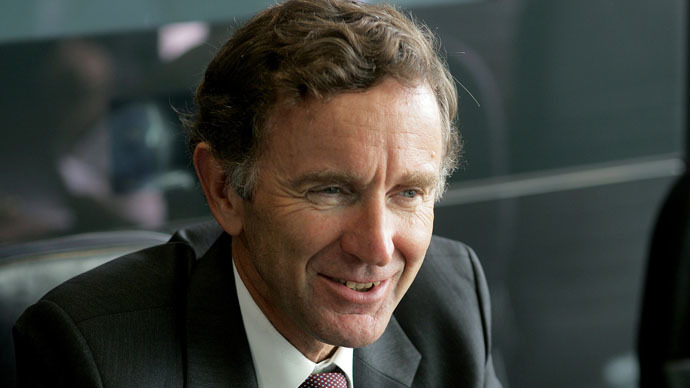Tory MPs blasted for allowing ex-HSBC boss and trade minister to dodge scrutiny

Tory MPs have been vilified by Labour following allegations they blocked efforts by two separate parliamentary committees to question ex-HSBC chief Stephen Green over tax dodging allegations that have shattered public trust in the banking giant.
A bid tabled by Labour to call Green before Britain’s influential Public Accounts Committee has been rejected after the Conservative-dominated committee voted the proposal down.
The tax and spending watchdog consists of eight Conservative MPs, five Labour MPs and a single Liberal Democrat.
Green, who transitioned from HSBC chief to Tory peer and government minister in 2010, remains unchallenged by any government committee over the allegations that have engulfed the bank.
While he left his post as trade minister in 2013, he remains a peer in the House of Lords. He left HSBC with a lucrative pension of £19 million.
‘To say that he did not know what was going on is ludicrous’
Labour MP Austin Mitchell had proposed that Green appear before the government tax and spending watchdog in early March. Mitchell said that it soon emerged Conservative members of the committee opposed his proposal.
READ MORE: HSBC chief rejects direct responsibility for bank's criminal activity in Switzerland
“The public has a right to know and parliament has a right to know, what the man in charge knew about this massive scandal,” Mitchell told the Guardian, referring to Green.
“He needs to clear these things up. He has taken the glory and taken the money. To say that he did not know what was going on is ludicrous.”
A core objection shared by Tory MPs to the committee’s questioning of Green is concern over the fact that he is a House of Lords peer. However, other peers have faced scrutiny by parliamentary committees on previous occasions, such as Lord Patten.
Chris Heaton-Harris, a Conservative committee member, said he was happy with the watchdog’s decision not to call Green for questioning. Committee chair Margaret Hodge told Channel 4 News the move was the spending watchdog’s decision.
Business as usual?
Green is also reportedly set to avoid questioning from a second highly influential government body, the Treasury Select Committee. Labour MP John Mann, a prominent member of the committee, said efforts to call the ex-minister and HSBC chief for questioning were blocked by Conservative members.
Mann suggested the Conservative Party was striving to avoid unwelcomed scrutiny of the scandal until after the May 7 general election.
A spokesman for the Treasury Select Committee claimed, however, no official proposal to probe Green was tabled.
He said the Committee had made the decision to respond to HSBC as it currently stands in a bid to adopt a “forward looking approach.”
The Treasury Select Committee spokesman acknowledged that allegations leveled at HSBC raise important questions, but he stressed the body made the decision to focus on the bank’s “current management.”
Critics warn the government’s apparent unwillingness to hold individuals accountable for HSBC’s transgressions stem from an establishment perception the bank is simply too big to fail. Others say the banking giant is also too big to regulate.
READ MORE: Conflict of interests? BBC Trust chief earns £10K per day from HSBC
The revelation that ex-HSBC chief Green appears set to evade parliamentary scrutiny follows a heated committee harding on Monday, which saw Stuart Gulliver, Rona Fairhead and Chris Meares grilled.
Gulliver is the bank’s serving CEO, Fairhead is both the bank’s non-executive director and chair of the BBC Trust, and Meares is the ex-head of HSBC global private banking.
Committee chair Hodge launched a scathing attack on Fairhead, calling on her to step down from her role as BBC Trust chief.
She said Fairhead’s inadequate performance as the bank’s non-executive director renders her unfit to continue her lucrative £110,000 per year BBC Trust role.
HSBC CEO Stuart Gulliver conceded that recent revelations regarding his personal banking and tax arrangements have inflicted further damage on HSBC’s reputation. Despite being drafted into HSBC as an agent of reform, staunch criticism of his personal tax affairs has surfaced in recent times.
Leaked bank files, dated 2005-07, reveal Gulliver sheltered £5 million at a Panamanian firm with his Swiss HSBC account. They also indicate he is domiciled in Hong Kong for tax purposes despite being a UK resident.
Conservative cover-up?
HSBC has come under intense scrutiny in recent weeks, after a string of global media outlets published damning details of 100,000 bank accounts held by the banking giant’s Swiss arm.
The leaked files revealed the bank’s alleged complicity in tax evasion and aggressive tax avoidance between 2005 and 2007. They also shed light on HSBC's practices of doling out large amounts of cash to clients in mixed currencies, and offering banking services to drug traffickers and criminals.
Conservative MPs’ bid to block the PAC’s probe of Green will likely spark a further tide of allegations that the party is seeking to thwart official scrutiny of the former HSBC chief in light of his relationship with Prime Minister David Cameron.
READ MORE: Business as usual? HSBC must clean up its own affairs, says Chancellor Osborne
Both Cameron and Chancellor George Osborne have faced heated criticism for offering Green a position as trade minister in 2010.
Challenged earlier this month on why they had not probed the ex-HSBC chief in 2010 about allegations directed at the bank, Osborne maintained there was no reason to.
He said as far as he was concerned the HSBC leaks had uncovered tax evasion on an individual basis rather than systemic collusion by Britain’s largest bank.
In the wake of the HSBC tax scandal, serious questions about the bank's overseas practices continue to surface.
Britain’s former Director of Public Prosecution, Ken MacDonald, said in February HSBC could be liable for criminal charges in Britain.












